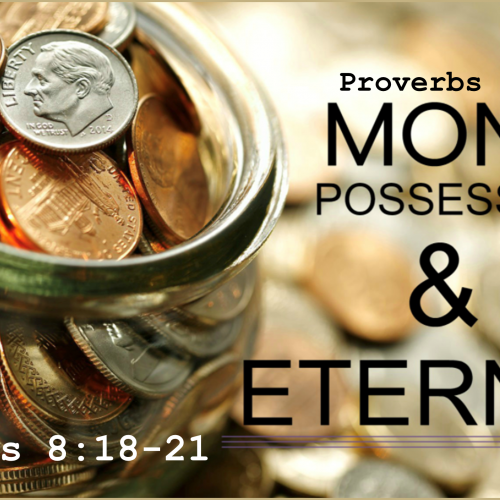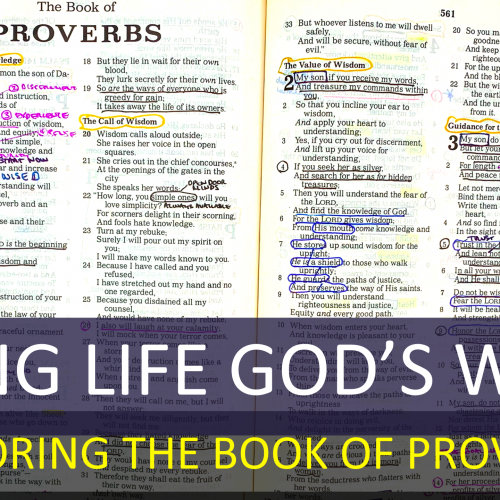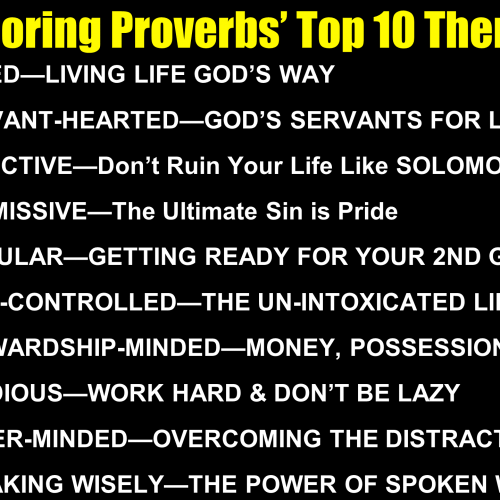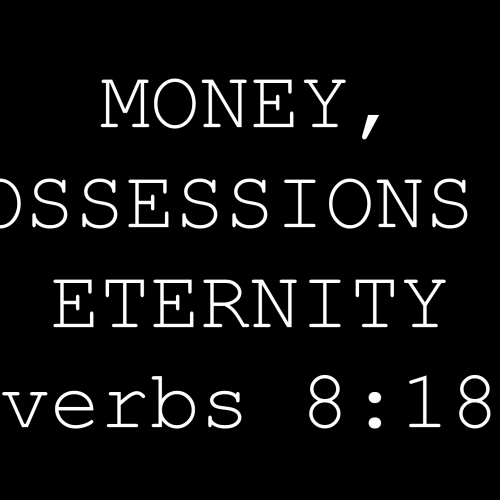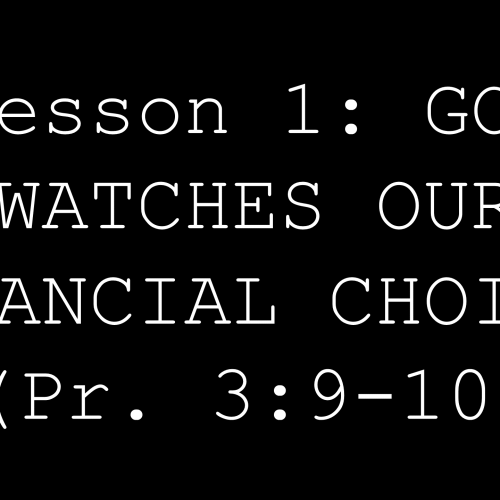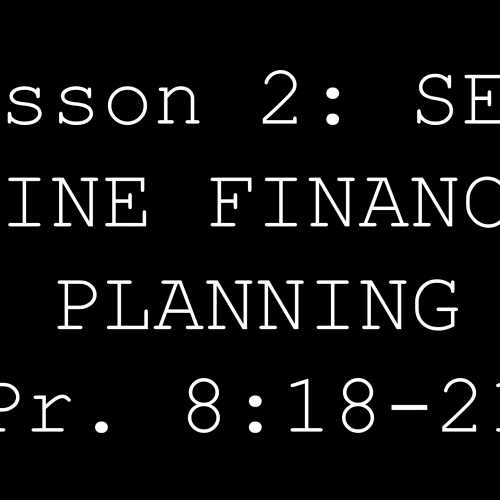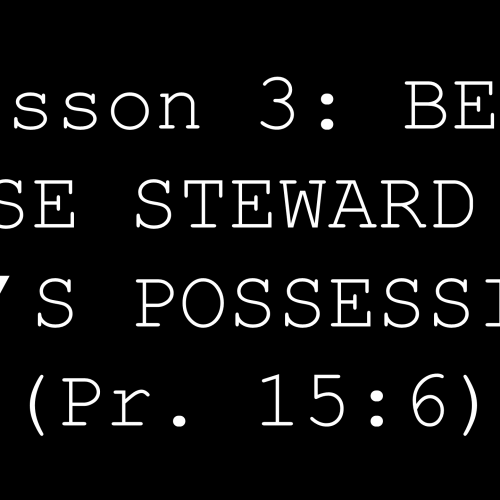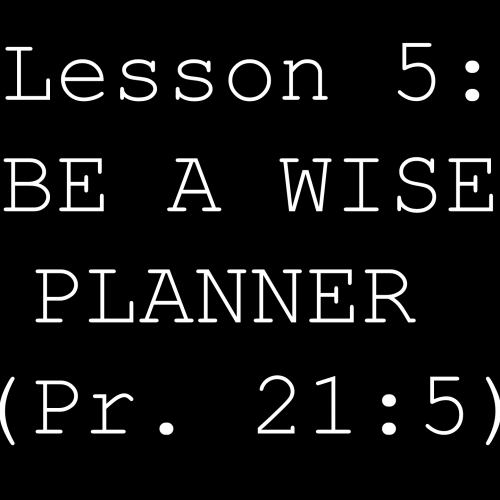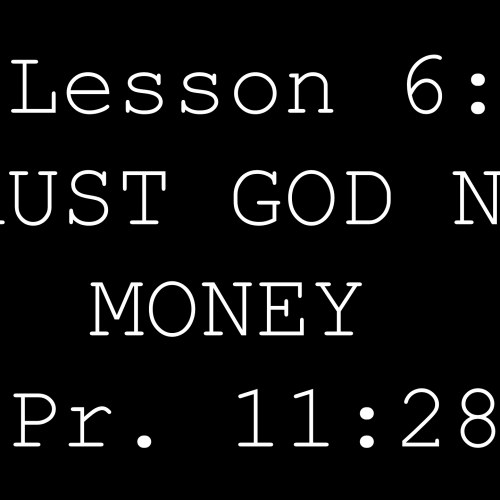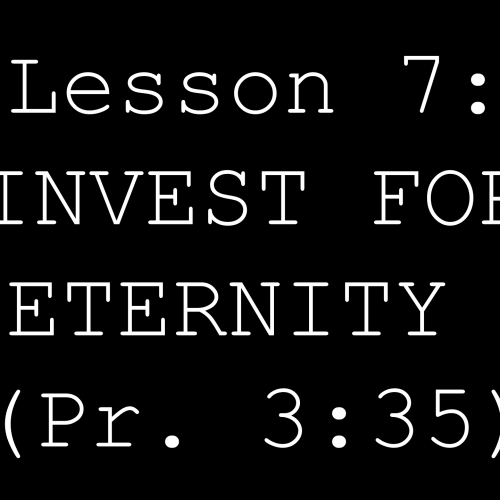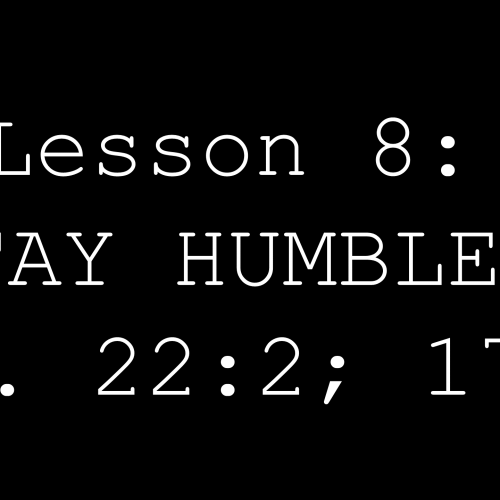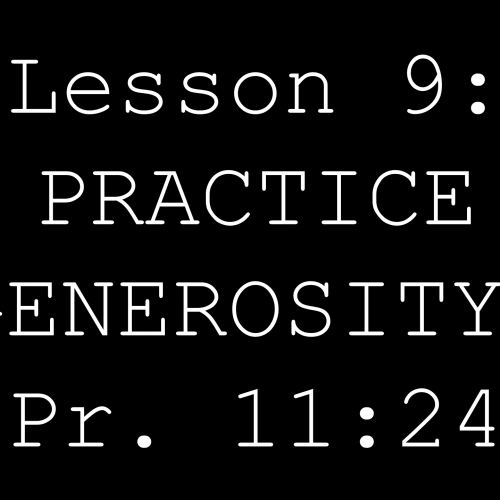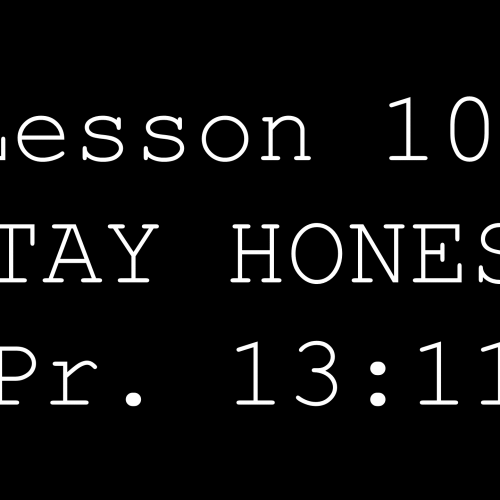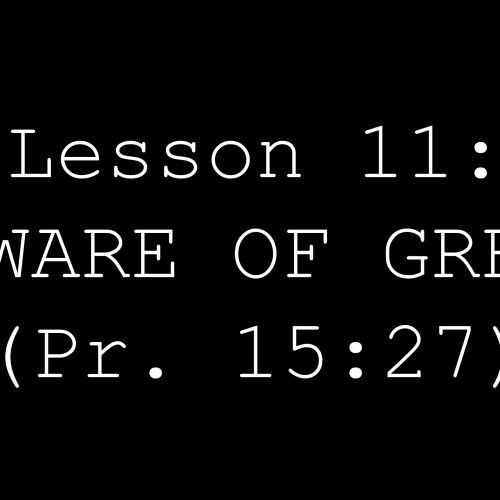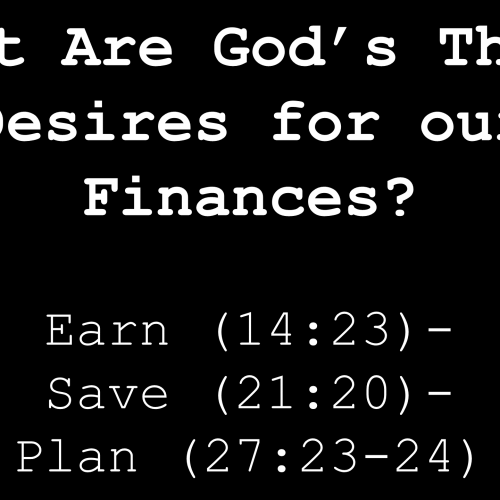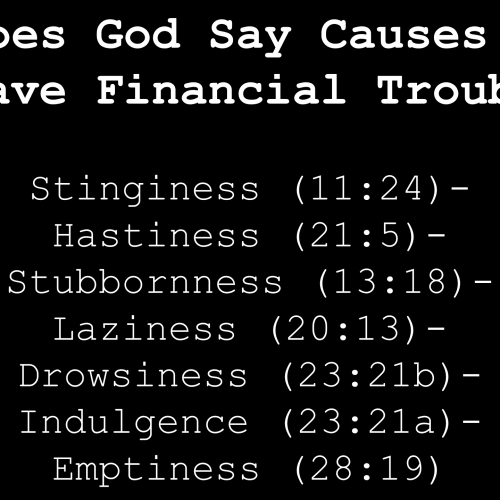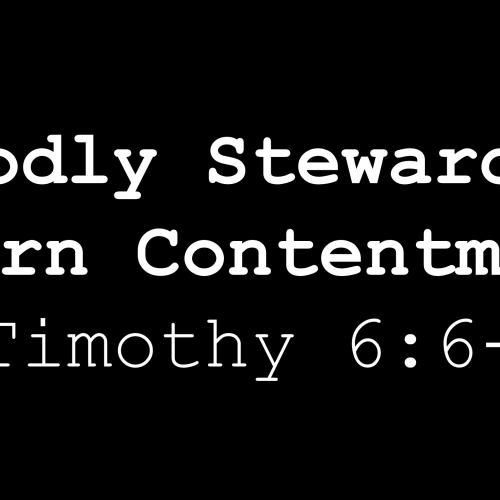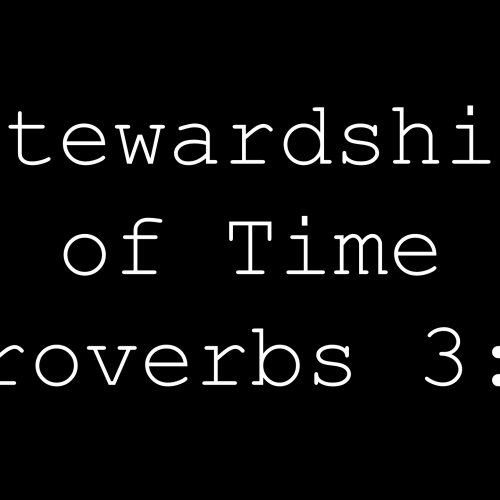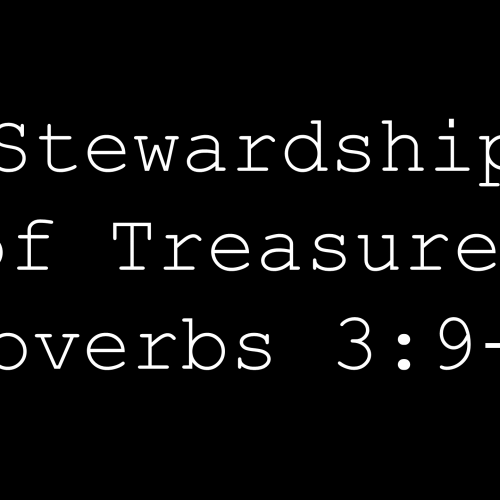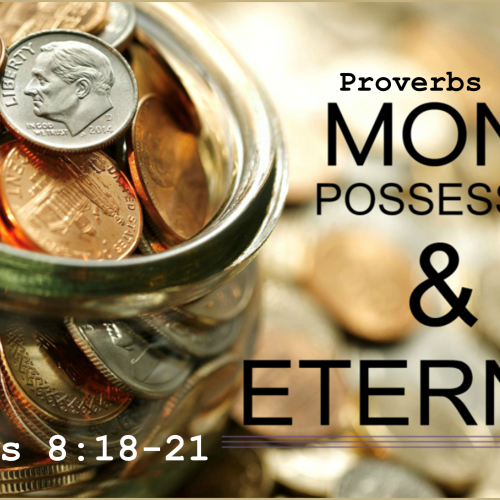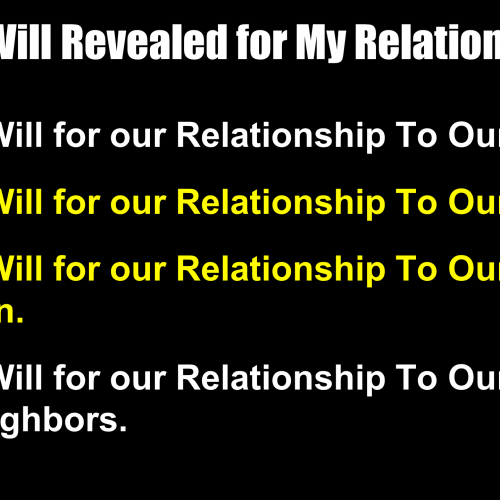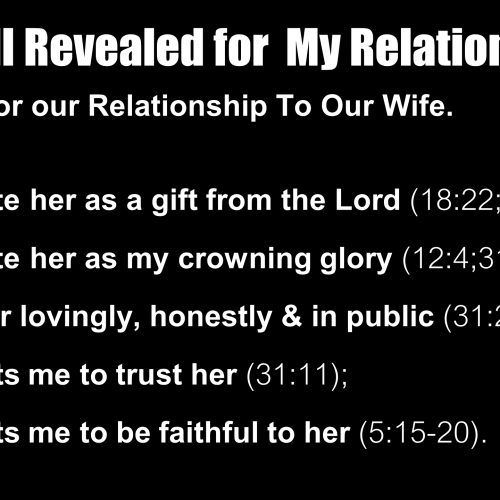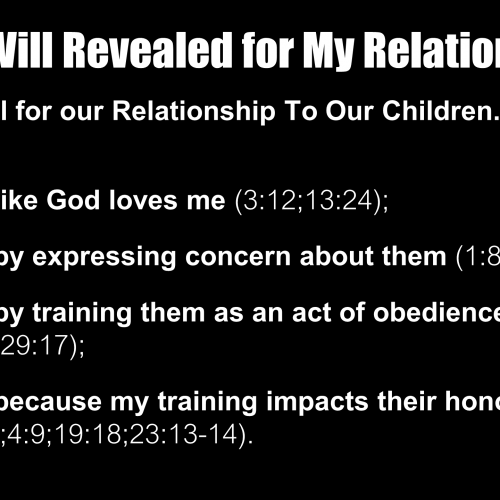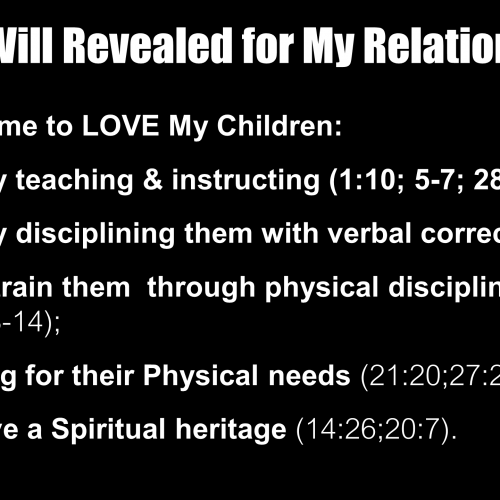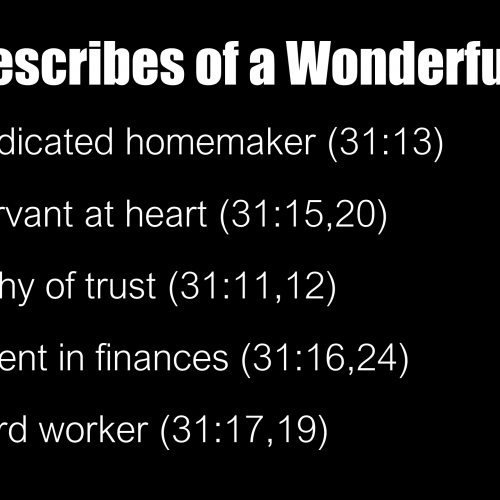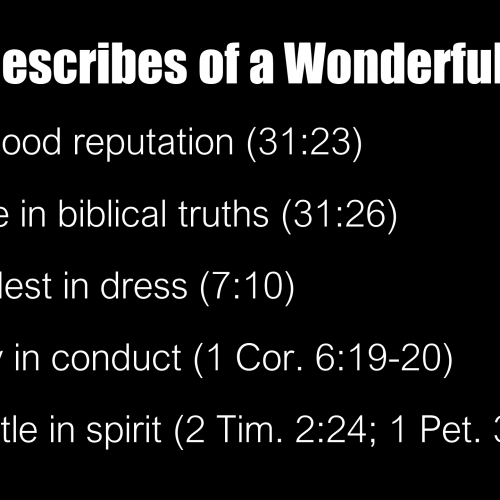If the YouTube video above is not available, here are two other ways to view:
EBP-07
201019PM
Transcription
It might surprise you to know that Jesus said more about money than anything else in the Bible. He has more to say about money than on any other single subject because money is an index to our character. It’s the way He measures our life. It manifests our heart. We can’t fully survey, in this hour of this lesson, all the Jesus said about money. But briefly this class, we’ll put you in touch with the most important things that Jesus said, which will help us understand how important money is and how it measures our spiritual life. Let’s begin by looking at what God explains in Proverbs about money, possessions and eternity.
Welcome to our seventh class. We were going through the book of Proverbs. If you’d like to get your copy of God’s word, we’re going to go here; to Proverbs chapter 8, starting in verse 18. We’re looking at Jesus’ biggest topic, money. What we do with our money, our possessions and how we look at those two in light of eternity, a plan. If we don’t follow His plan, as we’ll see in this course, it doesn’t work out.
Proverbs 8:18-21 says that this theme of money and possessions is part of the wise life. God watches our financial choices.
The first lesson of Proverbs is, God watches our financial choices. Now, what does that mean? That means He’s watching. Look at what verse 9 says, “Honor the LORD with your possessions.” He’s watching to see, when we do have money, when we do have possessions, when our crops do produce, do we think it’s all for me? Or do we say wow, I couldn’t have done that without you God. Now back over here, this verse contrasts the attitude difference between a saved person and a lost person. A lost person says, Hey I did it all myself. A saved person is humble, they’re not proud, and the wisdom from God they say, thank you Lord. See the slide. God watches our financial choices. God wants to know what our response is going to be to His blessings. Let me ask you, do you thank the Lord that you have enough resources to be, those of you that are in Bible Institutes right now and are watching this as one of your classes, have you stopped and said Lord, thank you that:
- I have sight and I can hear.
- That my parents or I earned enough money to pay the tuition.
- That I have a computer that works.
God watches our financial choices. He watches whether or not we take credit for all that we have, or we honor Him. See what verse 9 says? “With your possessions, and with the Firstfruits of all your increase.” 8:18 that you see on the slide goes back to the opening verses we read, but here’s the lesson seek divine financial planning.
Now look up from the slide and think about this with me. There are many people who are financial planners. They’ll help you. They will help you invest your money. They’ll help you get out of debt. They’ll help you have a long term strategy, a retirement strategy, having enough funds for children to go to school, college bills, medical bills. Financial planners, nothing wrong with them but you know what Proverbs 8:18 says? That we should seek God as our financial planner.
The third lesson, if you look at Proverbs 15:6, notice what it says. God says in Proverbs 15:6, he wants us to be a wise steward, listen, of God’s possessions. Now look up from your slide and think about this. What are God’s possessions? All I have belongs to God. Why? Because I’m His servant. Because I was redeemed. I was bought at a price. Do you see the difference between the saved and the lost? The saved realize that they are living for eternity, that everything they have belongs to God, even their body. They were bought at a price, as it says in 1 Corinthians 6. What do lost people think? They live for now. They’re very foolish and rebellious because they’re lost. They’re proud and they don’t think that their money belongs to someone else, it belongs to them. Be a wise steward of God’s possessions. That means everything I have belongs to the Lord, according to the scriptures. Now, chapter 15, be a wise steward of God’s possessions. The way to not have God resist you is to do something I’ll never forget. My pastor, when I was growing up asked all of us, he had this service and he said, I’d like you all to do dedicate your life and all you’ll ever own to the Lord. He said, if you do it as a young person it will make life a lot easier. So as a teenager, just starting to work, just starting to buy, or start saving money for that first car and look forward to buying it, I remember standing in a consecration service in my youth group at Lake Lansing Baptist Church saying, Lord. And the pastor actually had us step forward like we’re stepping onto an altar. He was a very zealous preacher of consecration. He says, now step up onto the alter in your mind and say, Lord I belong to you and everything you ever give to me belongs to you. I consecrate it to you. Look back at that slide, the third lesson of Proverbs is, be a wise steward of God’s possessions.
How does that happen? By me surrendering everything to the Lord. Now, if you’ve never done this Romans 12:1&2 is the verse that all of us should think about. Romans 12:1-2, “I beseech you therefore, brethren, by the mercies of God, that you present your bodies a living sacrifice.” God wants us to consecrate, dedicate, sacrifice ourselves to Him. Then, we become stewards of what God possesses. So, that means my life isn’t my own anymore. My money isn’t my own. My time isn’t my own. I’m just a steward that answers to God.
If you look at the next slide, Proverbs 22:4 tells us a very interesting truth. We should handle all money like God is watching. Let’s turn to Proverbs 22 and verse 4, it says this “By humility and the fear of the Lord are riches and honor and life.” What’s the key there? Fear of the Lord. What’s the fear of the Lord, knowing that God sees me. What does that translate into? I handle my money, my possessions, my life, everything that I have, like God’s watching what I do with it. That’s the fear of the Lord. It’s this awareness that I’m never alone, that God is watching what I do and that I’m someday going to stand and give an account to Him for what I did with His money, with His time, with His treasures, with my body. That’s why it’s so important to present ourselves as a living sacrifice to Him.
The fifth lesson is in Proverbs 21 and verse 5. Basically, what God says is, simply be a wise planner. We have a choice to make, let me read it to you. “The plans of the diligent lead surely to plenty, but those of everyone who is hasty, surely to poverty.” Now, look up from your slide, God extolls planning. See what it says, “the plans of the diligent.” What is He saying? The person that starts thinking, let’s see if I have two sheep, I need a place for the two sheep to be during the rainy season, I’ve got to prepare a shelter for them. See, they diligently plan, they don’t just let things happen because, see the second part of verse 5. Anyone who’s hasty, it leads to poverty. They don’t want to plan. They just want to do something and get it over with and go on with what they want to do. See God says, I should want to behave, what the New Testament calls decently and orderly planning, preparation, diligence, be a wise planner. Wisdom from God says we don’t just go through life bumping into things, wondering what’s going to happen. We use our God given wisdom to think and plan and be diligent. What I’m saying is so contrary to society. Society says, Oh, let people just have this chaotic, disorderly life, they learn through chaos. No. God says, orderliness, diligence, planning is part of His wisdom that’s from above.
The sixth lesson from Proverbs is trust God, not money. We’re going to have to turn to Proverbs 11 and verse 28, because this is really one of the dangers. This verse will come up again but let me read to you Proverbs 11 and verse 28. “He who trusts in his riches will fall, but the righteous will flourish like foliage.” Now, you don’t have to make weeds grow. You don’t have to make grass grow. You don’t have to make trees grow. They just are wired that way. The longer they’re there, they just get sunlight and water, and they just flourish like foliage. Now look what it says, He’s saying in this verse. In 11:28 it says, “He who trusts in his riches will fall, but the righteous…” those who trust God not money, “the righteous will flourish,” just as natural as it is that plants and animals grow if they just have food and water and sunlight and exercise.
So, the righteous flourish, trusting God not themselves. What Proverbs is telling us is, it’s so easy to trust ourselves to trust our way and not pause. That’s even why the Lord says we’re supposed to pray before our meals. What are we supposed to do? Why pray before the meal? We’re supposed to take knowledge that our very life’s breath comes from God.
Do you remember Daniel standing in front of Nebuchadnezzar, the ruler of the world of that day? Nebuchadnezzar was so powerful, and he looked at Daniel, do you know what Daniel says? Actually, in Daniel, when he told him about the Lord. Creator of Heaven and Earth. The King was shocked at the testimony of this man, who was willing to be standing against the gods of Babylon. Then a little bit later the second king, Belshazzar, looked at Daniel and said, what’s that handwriting on the wall? Daniel said to him, “the God in whose hand is your life’s breath.” What Daniel said is that we trust God, not ourselves. God holds our life. He holds riches, they come from Him. Money, even the strength to live. The sixth lesson is trust God, not money.
Look at your slides. The seventh lesson is, think about investments not for the moment, but for eternity. Now, turn with me to Proverbs 3 and verse 35. “The wise shall inherit glory, but shame shall be the legacy of fools.” Invest for eternity. “The wise shall inherit glory.” Now, not just this glory that people say, wow the Lord is blessing your life and you have all this prosperity. But glory, look at this, the saved, and submissive, and humble those who are going God’s way are living for eternity; glory is not just the wonder right now, it’s the place we’re going. We’re going to live in the glorious presence of God forever.
What does it say in 35, “but shame shall be the legacy of fools.” Wow, because they’re headed to destruction. Man’s way, Jesus said is the broad way that leads to destruction. So, what’s the lesson? Invest in eternity. Invest what? Invest your money. Invest your time. Invest your treasures for eternity. Think about the long haul. Think about where we’re headed. Think about who we’re going to give an account to. The seventh lesson, invest in eternity.
Proverbs goes on to say, stay humble about your money. We’re going to read two verses. There in Proverbs 22:2 it says, “The rich and the poor have this in common, the LORD is maker of them all.” Do you understand? The Lord makes the rich and the Lord makes the poor. He said, the poor you will always have with you. There are some people that the Lord has created them, and they basically have their little patch of land, this is 3000 years ago. They had their little farm and they just grew enough there to live on and eat. They never really amassed a lot of stuff, they are poor. There are others next to them that amassed so much and have so much and are rich. Guess what? God is the God of both.
Look at that verse again, look at 22:2. “The rich and the poor have this in common, the LORD is the maker of them all.” Why do we get proud? Because we think being rich is better than being poor, which means we’re greater. Humility is accepting what God gives, we submit to Him. There’s something about the pride that comes with riches that the Lord is very opposed to. He says that the rich are infected, in the book of James, with pride. Look at 17:5, “He who mocks the poor reproaches his maker; he who is glad at calamity will not go unpunished.” God says, stay humble. Don’t think you’re better. Don’t mock the poor. Now look, in our age it’s so easy on social media to be sarcastic, and critical, and to look down on, and to brag, and to show off. What does 17:5 say? “He who mocks the poor reproaches God, their maker. ” The best way to deal with financial things is stay humble and don’t incur the reproaching of our creator God, who is the maker of the rich and of poor.
Lesson nine, if you look at your slides, is practice generosity. “There is one who scatters, yet increases more; and there is one who withholds more than is right.” Now, what is this talking about? This is talking about generosity. As Jesus said, “it’s more blessed to give than to receive.” It says in verse 24, “there is one who scatters.” In other words, he keeps giving, it keeps going out from him. “Yet”, verse 24, “he increases more, but there is one who withholds,” he doesn’t scatter. He just holds on and gathers more and more and clings to everything and verse 24 says he “withholds more than is right, but it leads to poverty.” What does God say? He said, I love you being generous. I love you sharing. I love you taking from what I’ve given you and giving it to others that are in need. The Lord says I will bless that, God blesses generosity. Remember a few lessons back, I told you that God’s always watching. That’s one of these lessons from Proverbs, God is always watching what we do with our money and when He sees us being generous, He blesses us. When He sees us being stingy and withholding more than we should, He withholds blessings from us.
The 10th lesson, number 10 is stay honest in your dealings financially. Proverbs 13:11 in your Bibles. This is what it says, “Wealth gained by dishonesty will be diminished, but he who gathers by labor will increase.” God is watching and if we don’t stay honest, He’ll resist and even remove our gain in our lives. You say, wait a minute. What about all these people that are, stealing from corporations and everything? Yes, God is not quick in His response. The way that God deals with mankind is a long-term way. The eternal principle is, stay honest. Money gained by dishonesty means it dwindles fast away. “Wealth gained by dishonesty will be diminished.” Now the Lord is always watching, and you want to have His blessing with your finances. Stay honest.
Number 11, beware of greed. Greed is always, always condemned by God in His word. Proverbs 15 verse 27 says this, “He who is greedy for gain troubles his own house, but he who hates bribes will live.” The key is greediness for gain won’t just harm me, it’ll harm my family. There are so many examples of this but what God says is, as a principle of His word be aware of greed, accept what God gives us. It’s a whole part of contentment.
In the next slide. What are God’s three desires for our finances? This is a broad look. See the three that are on your slide?
- Number one, earn.
- Number two, save.
- Number three, plan.
Do you see those three on your slide? Now, let’s go through them and jot down these verses or make a note in the margin of your Bible. If God was giving you a big picture of what His plan is for money, number one, it would be to earn. Look at chapter 14 of Proverbs, God wants us to earn our money. “In all labor there is profit, but idle chatter leads only to poverty.” What is God saying? He said, I’ve designed that you work hard and earn money. That’s how money is supposed to come. Money is supposed to be earned. So that, we pay the price to get it. That’s God’s desire.
Secondly, He says in chapter 21 in verse 20, “There is desirable treasure, and oil in the dwelling of the wise, but a foolish man squanders it.” What is this wise? People don’t spend everything. In fact, another portion of scripture says, divide your portion into six and seven. What it means is that you have six parts out of seven, that you always save one part. That’s saying save 15%, if you actually follow that as a pattern. That would be a wise thing because many people save nothing. They spend all they get or even more than they get and go in debt. What’s God’s goal for our finances? Number one, to earn money. Number two, to save money.
Number three, look at chapter 27 and verses 23 and 24. It says this, “Be diligent to know the state of your flocks, and attend to your herds; for riches are not forever, nor does a crown endure to all generations.” Do you know what the financial principle is there? Plan. Be diligent to know the state of your flocks. Are you going to have enough? Now, this is going back 3000 years. Are you going to have enough food to get them through the winter? Are you going to have enough water to get them through the hot summer? Are you going to have a place to keep them safe in the storm? Are you going to have a place to store your crops that you’re growing? Look at this 23rd verse, “Be diligent to know the state of your flocks and attend to your herds.” God wants us to be planners and that’s a part of earn, save, plan. You want to go to a financial seminar led by the Lord in Proverbs? He says, work hard and earn, don’t spend. In fact, He says don’t go into debt, don’t spend all you have. Always save some and plan.
The next slide, what are the three dangers of money that God warns us about? You see on the slide,
- Number one is pride. We’re going to look at those verses chapter 28, verse 22.
- Number two is the uncertainty of money and wealth, and how hard it is. It’s very interesting how God describes it in 23:4 & 5.
- Then the ultimate danger, misplaced trust. What that means is, that God says you can trust your money.
So, let’s go through these. Open in your Bibles to chapter 28 and look at verse 22, it says “A man with an evil eye hastens after riches, and does not consider that poverty will come upon him.” What God says is that a man with an evil eye, a man who is… remember we’re over here. The lost, rebellious, proud person… is just living and his money he’s pursuing for himself. The danger of money is that we pursue it just for ourselves. For pride purposes, that I can use my money to show off what I have, My possessions or my lifestyle. That’s the first danger.
The second danger is back in chapter 23. Not only is pride one of the things that we should be aware of that comes with wealth, it’s uncertainty. Proverbs 23, verses 4 & 5, “Do not overwork to be rich; because of your own understanding, cease! Will you set your eyes on that which is not? For riches certainly make themselves wings; they fly away like an eagle toward Heaven.” You know what one of the dangers of wealth is? The uncertainty of wealth. How it appears for some people, that they get all this money and it’s just gone. Look at the lottery winners. If you want to do a study, there’ve been so many major news organizations that have followed these who have made a fortune on a lottery ticket that they bought somewhere and had no idea what to do with money and the money had wings, and it flew away. God says, there’s great uncertainty in riches.
There’s another one, chapter 30, and this is really the biggest danger of money. Chapter 30 of Proverbs and verses 8 & 9. “Remove falsehood and lies far from me; give me neither poverty nor riches.” Why? “Feed me with the food allotted to me; lest I be full and deny You, and say, ‘who is the LORD.’ “ Whoa, what is that? I say, I don’t need the Lord, I have my money. We trust in God, not our riches. The danger is trusting in the riches, not in God.
God says there are three dangers that we face with our money. Being proud about it or thinking it’s never going to go away, not realizing that it’s temporal and uncertain, or if we have it trusting in that possession, that money, that job, that income, that career, rather than in God who gave it to us. So, beware of those three dangers of money.
The book of Proverbs is fascinating. The next slide is it’s just stepping back, looking at all 31 chapters of Proverbs, and surveying them and saying, what does God say causes some people to have financial troubles. Basically, here is the list that you can find. By the way, there are probably many more but combing through, the ones that jump out immediately are:
- Number one, stinginess.
- Number two, hastiness.
- Number three, stubbornness.
- Number four, laziness.
- Number five, drowsiness.
- Number six, indulgence.
- Number seven, emptiness.
Now, let’s go through these one at a time, starting in Proverbs 11 and verse 24. I’m just going to read these one after another and repeat this danger that causes people to have financial trouble.
The first one is stinginess. It says in Proverbs 11:24, “There is one who scatters, yet increases more;” remember we already covered that verse but look at this, “there is one who withholds more than is right, but it leads to poverty.” What causes some people have financial problems? They’re stingy. Their hearts are so grasping money that God resists them, and they have financial troubles.
Look at chapter 21, verse 5, Proverbs 21:5. This is what it says. “The plans of the diligent lead surely to plenty, but those of everyone who is hasty, surely to poverty.” Hastiness, those who don’t think fully through the implications of the financial decision they’re making, the purchase they’re making, the debt they’re incurring, the upkeep of the possession they’re getting. God says don’t be hasty.
Chapter 13, verse 18. It says be aware of this, be aware of stubbornness. “Poverty and shame will come to him who disdains correction, but he who regards a rebuke will be honored.” What the Lord says is, if you’re stubborn and you won’t listen you will have financial troubles. Most of us have the benefit of wonderful people around us. They say, I wouldn’t do that if I were you. They’ll look at us and they’ll say, I’ve already tried that, and it didn’t work. There are some people so stubborn, they think because of their pride, that they know better than everybody else. What the Lord says is, there’s a cause for people that have financial troubles, they might be stingy, they might be hasty, or maybe it’s stubbornness.
Or look after 20 and verse 13, the Lord said here’s another one. 20:13, “Do not love sleep, lest you come to poverty; open your eyes, and you will be satisfied with bread.” That’s laziness. It’s a person who doesn’t want to. They just want to lounge around, stay in bed all day, and they just think someone will give them something.
That goes right with chapter 23. And look at verse 21, the second half of it says, “And drowsiness,” verse 21, “drowsiness will clothe a man with rags.” It’s the second half 21b. Someone who is drowsy, they just say, Oh I just can’t start the day. Oh, I can’t, it’s too big a project, I’m just going to go lay down. Drowsiness leads to financial troubles.
As well as, look at chapter 23, the first part of verse 21. “For the drunkard and the glutton will come to poverty.” It’s indulgence, the drunkard and the glutton, the one that drinks too much alcohol, the one that eats too much food. Indulgence and drowsiness are a pathway to financial ruin.
The last one, chapter 28 in verse 19. “He who tills his land will have plenty of bread,” but look at the end of that 19th verse, “but he who follows frivolity will have poverty enough!” What’s frivolity? It’s emptiness. It’s just doing something that has no meaning.
What the Lord says is, if you really want to struggle in life then:
- Be stingy with what money you have.
- Be hasty in making financial decisions.
- Be stubborn and not listen to any correction.
- Be lazy and don’t even get out there and work.
- Be drowsy all the time and find an excuse to not finish things.
- Be indulgent, overeat, and over drink.
- Or just follow frivolity.
You know what I’ve just described? There are so many people in life that are this way. Now, remember how the whole book of Proverbs starts out, way back when we started this. I read to you those verses that said, my son. Solomon originally, 3000 years ago, took Rehoboam his son and stood him in front of him and said, Rehoboam look over there, do you see that person who is causing a fight? They’re going to get in trouble. They shouldn’t meddle with other people’s hope. Look over there, do you see that person laying on the bench and not doing any work? They are lazy and they’re going to… Look over here, do you see that woman? She’s enticing that man. She’s a harlot and you shouldn’t…The whole book of Proverbs beginning with, that part of Solomon explained to Rehoboam in chapter 3, that whole picture is pointing out people that were headed the wrong direction. If you see people that are stingy and hasty and stubborn and lazy and drowsy and indulgent and empty frivolity, they’re headed for financial troubles.
I just read a newspaper that one very famous movie star has earned $70 million from making movies and his current spending, he spent $90 million. The banks were coming after him because he owed $20 million that he didn’t have. Now, that is a classic example that Solomon would have pointed out to Rehoboam and that God warns us of.
In the next slide, to apply this, we could spend a long time looking at all of these pictures of people that have made wise or foolish financial decisions. But what about us today in the 21st century? Those of us living in the New Testament world, living under grace. The book of Proverbs is wisdom. How do we apply it to our lives today? This slide, godly stewards, remember this whole part of Proverbs is about being a steward of what God’s gives us. Godly stewards learn contentment. Turn in your Bibles to 1 Timothy chapter 6, and we’re going to spend the next few minutes walking through the apostle Paul explaining to Timothy in chapter 6, what it means to be a steward for God. In other words, Paul is assuming that Timothy already understands. That he has surrendered to God and that everything he has received is a gift from God. His life, his time, his spiritual gifts that he has as a man of God, and that he is just supposed to be a steward that’s going to answer to God.
This is, and if you follow along in 1 Timothy chapter 6, Paul is writing to Timothy reminding him what a steward looks like, so that Timothy can teach this as a pastor. Remember, Timothy was the pastor of the church in Ephesus at this time. The church Paul had planted and founded and started. Then Paul is taken away by the Romans and in prison. Timothy comes in and becomes their pastor. This is what Paul says starting in 1 Timothy chapter 6 in verse 6 and he says this; principle number one, 1 Timothy 6:6, “Godliness with contentment is great gain. For we brought nothing into this world, and it is certain we can carry nothing out.” Do you know what that means? Remember that things are only temporary. Do you remember what it said in Proverbs? Watch out for your riches, they’ll get wings like Eagles and fly away. How does Paul apply that proverb to Timothy? He says, verse 7, “we brought nothing into this world, and it’s certain we can carry nothing out.” Always remember that things are temporary.
What’s the beginning of that verse 6? “Godliness with contentment.” Godly stewards need to learn contentment. We need to learn that we’re thankful for what God gives us. Now you say, wait a minute, what if I’m having financial trouble? If you’re practicing drowsiness and stinginess and indulgence, you’re supposed to have trouble, but if you are being disciplined, living a life submissive to the Lord, humbly in wisdom, living for eternity, God’s desire is not that everyone be rich. By the way, that’s an error of one segment of Christendom that says, if you just have more faith, you’ll be rich.
Did you know, most people throughout Bible history, the history of the church had been poor? Now, they’ve been rich in faith, but they haven’t been rich in material things. Why? Because the government, the Roman government was against them all throughout history. Christians have been persecuted in many parts of the world. Christians cannot get ahead. For me personally, when I was in college, I used to be a courier for Bibles. They call them Bible smugglers. I said, I’m a courier. I took Bibles in from Western Europe to Eastern Europe, into the communist countries. It was very exciting and very fascinating work, but you know what? I learned the families that I delivered those Bibles to in Poland and Romania and Czechoslovakia, in East Germany, in Hungary; all of the Bibles that we got into Russia and to the Ukraine, do you know what the Christian families were like? Poor. Why? Because under communism if you were a Christian and the government knew it, your children could not go to college. They could not become anything educated, a professional, they were laborers for life and so were you. That was just the way it was during the years of communism, those 70 years. So, Christians who were gifted, who were godly, who were submissive to the Lord and humble and living for eternity lived in terrible poverty. What did God say to them? As He said throughout all the centuries, 1 Timothy 6:6 “godliness with contentment is great gain. We brought nothing in this world, and it is certain we can carry nothing out.” But what can you do? You can send it ahead. Anything we do sacrificing for Christ; we send ahead to eternity.
The second thing Paul told Timothy is in verse 8, and this is what he says. He says in verse 8, “And having food and clothing, with these we shall be content.” What does verse 8 mean? That we should seek necessities and wait for the rest. The only thing we should seek for is food and clothing. In other words, shelter, and survival. That’s the only thing we have to have every day, not the latest iteration of electronics. Did you know, as a pastor for decades, I would sit down with couples having financial problems. One of the things I used to do is, I’d say if you really want help bring your Bible and also just bring some of your financial records so we can talk about it. One thing that’s neat to do is, at first, I used to ask for them to show me their checkbook but who uses checks anymore, what’s really telling is their charged bill. I’ll never forget one couple who came in that were $24,000 in debt on their credit card. The wife said, we just don’t know what happened. I said let’s look at the charge bill. I said, what is that? Oh, they said those are sweatshirts. We were on vacation and our whole family bought sweatshirts $40 each, for six people, $240. I said wow and you borrowed money on your credit card. Oh yeah. Do you see that? We live in a society where people spend money they don’t have, because they can charge it. They can have credit; they can go in debt. You know what God says? “And having food and clothing” be content. Only seek necessities, wait for the rest.
When Bonnie and I, my wonderful wife, she’s sitting over there and always a distraction when I look at her, did you know when we first got married and moved to California to be on staff at Grace Community Church, we only bought things when we had enough money to pay for them. We decided we’d never be in debt and we’ve never been in debt our whole 38 years of marriage. We’ve always been able to pay fully for, whether it’s the car or whatever. Other than our mortgage that we always paid and put a lot of money down. But other than that, never were in debt. Did you know, our first couch, we waited a whole month and then we went to the Goodwill and we bought a recondition. That means a used couch. Before that the only furniture we had in our house where crates. We went to the local grocery store and asked them if we could have the crates that produce came in. Back then there used to be these beautiful wooden crates that things came in. We had one crate that was a nightstand. We had another crate that was an end table. Then we went to a garage sale and I could go on and on with how fun it was. Do you know what? We waited. We only sought necessities. We got an apartment and we moved in, but we waited for everything else. You say, oh those are great stories from the old days. Are they?
“Godliness with contentment is great gain. We brought nothing into the world, and it is certain we can carry nothing out.” Verse 8, “and having food and clothing, with these we shall be content.” Why? Verse 9 the next principle is, avoid a consuming desire for prosperity. Verse 9 says, “those who desire to be rich fall into temptation […] and many foolish and harmful lusts […] for the love of money is a root of all kinds of evil, for which some have strayed from the faith […] piercing themselves through with many sorrows.” Avoid a consuming desire for prosperity. That’s a summary of the whole book of Proverbs. You want to live God’s way? Don’t spend your life consumed with having more and more stuff and of working more and more hours so you can buy more and more things and spend more money than you earn and hope to pay for them over many years. That is the lie of the world that has enslaved our society. The book of Proverbs says that you are a slave to whoever you owe money to. Most people are a slave to the lenders for their car, for all of these things they bought that they couldn’t afford. They’re so far in debt, even for their education, that they will be paying for that the rest of their life, and never able to do this; say Lord, I surrender to you and I would like to do anything you want me to do in life. Most people can’t say that because they’re so far in debt. Because they’ve spent a lot of their life with a consuming desire for prosperity.
The next verse is in verse 11 and in 1 Timothy 6:11it says this, it says, “but you, O man of God, flee these things.” What things? The love of money, materialism, all that… flee all that “and pursue righteousness, godliness, faith, love, patience, and gentleness.” What does that mean, flee materialism? Do you seek to accumulate possessions or grow in Christ’s likeness? I meet so many people, they say I don’t have time to read the Bible or have time to memorize. Why? I have to work all the time. Why do you have to work all the time? Because I’m so far in debt. Flee materialism.
Verse 12 it says this, “Fight the good fight of faith, lay hold on eternal life.” Do you know how you learn contentment? You cling to eternal life. You say this world is not my home, I’m only here temporarily. I supposed to be a Pilgrim, a stranger. I’m going to cling to life eternal. I’m going to get my joy and delight in life knowing that I have a place not made with hands, eternal in the Heavens. I don’t have to have the best of everything life has to offer. I would rather have the smile of the one that loved me. That’s how Paul taught Timothy to go into the storm of the persecution that was coming in the days ahead in the Roman Empire. He said, I want you to learn that you should remember things are only temporary. Versus 6 and 7. You should only seek necessities and wait for the rest. You should avoid a consuming desire for prosperity. Flee materialism. Cling to everlasting life.
Last slide before we go, godly stewards, Peter said, resist materialism. Now look up from your side for a second. Guess what? Peter and Paul and John all had the same message for the church at the close of the New Testament era. Peter is going to die at the hands of the Romans, crucified upside down. Paul’s going to be beheaded by the Roman Empire. John is going to be exiled on Patmos. Those three monumental Bible writing leaders all had the same message, watch out for materialism. Do you know what the plague is today of American Christendom and western society? Materialism, instead of looking at how to live life God’s way and seeing money as coming from God, and possessions belonging to God, and living for eternity as stewards, we’ve bought into materialism. We spend our lives, measuring them by what we possess, what we wear, what kind of car, how big our houses, how new our electronics are, how we appear socially. Anyway, Peter said, look at that slide, resist materialism. That’s the secret of a life pleasing to God in a doomed and dying world.
Now go with me to second, Peter, and I’m just going to give you this as a challenge before our class is over. 2 Peter chapter 3, starting in verse 9. “The Lord is not slack concerning His promises, as some count slackness, but is longsuffering toward us, not willing that any should perish but that all should come to repentance.” Do you know what that says? The purpose of our life here is simple, live redemptively. What does that mean? God is “not willing that any should perish, but all should come to the knowledge of repentance.” Let me ask you, when’s the last time you shared the gospel with anyone? Are you seeking to take people with you to Heaven? There’s only one thing, out of this Earth you can take with you to Heaven. Do you know what that is? People. People, that you’re a part of them coming to Christ.
Do you remember, I told you in the first class that one of these classes was posted on YouTube, a lady found it coming home from a concert, looked on her phone, listened to the message, trusted Christ sitting on that subway. Do you know what? Bonnie and I, because she films these and I teach, Bonnie and I are taking someone with us to Heaven. Why? Because we live redemptively. Our goal is to share the gospel, to share a gospel track, to share a gospel witness, to tell people how they can go to Heaven.
But it doesn’t end there, look at verse 10. “But the day of the Lord,” this is 2 Peter 3:10, “the day of the Lord will come like a thief in the night, in which the heavens will pass away with a great noise, and the elements will melt with fervent heat; both the Earth and the works that are in it will be burned up.” What’s that God says? Everything around, everything you see, even my wonderful whiteboards are all going to burn up. Everything on Earth that you see is going through the fire of God and it’s going to be consumed. Live for eternity.
Back over here, do you remember this? God’s way is that when we get saved, we receive His wisdom, we submit to His plan, we live humbly for eternity. Man’s way is born lost, rebellious against God, foolishly thinking that they know what they should live for, so they live for now, proudly. What does it say in the scripture? Everything’s going to burn up, live for eternity. That’s the secret, on your slide, of a life pleasing to God in the doomed and dying world. That’s a summary of what the book of Proverbs is about. Money and possessions are to be held on to lightly because we are living for eternity.
That’s class seven. That’s my challenge to you from the book of Proverbs, to live life God’s way. It’s a measure, as Jesus said, of our heart, what we do with our money. How we view our possessions shows what our heart’s view of God’s ownership of our life. If you’ve never consecrated yourself to the Lord, said I want to be a living sacrifice, as we close this class this might be a time to either begin or renew that.
Let’s bow together.
Father, I pray that we would respond to the truth of your word and live a life that is sacrificed. It’s a living sacrifice that we say, I am not my own. I’m bought at a price and everything I get in life, money and possessions, I get as a gift from You. I might earn them, but you gave me the life to live and strength to earn them. So, I’m just a steward. I’m using, and earned, and possessing what really belongs to you. You’re watching me and I want you to see in my heart that I want to please you with my money, with my time, with my possessions, with my inner attitudes toward all things. I pray we’d live redemptively for eternity. In the name of Jesus we pray. And all God’s people said, Amen.

